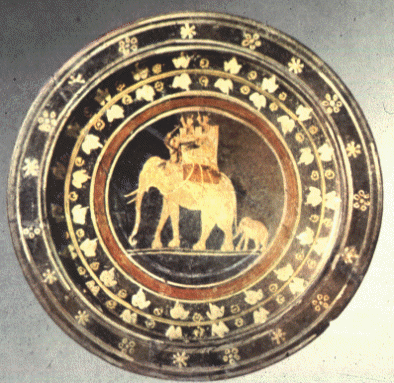Sunday, April 25, 2010
a pyrrhic victory
Okay, I know what a pyrrhic victory is. Basically, it's when you win the battle but lose the war. Or when, in broader terms, your very success defeats you. Say you argue your girlfriend into the ground with your superior logic and feel very satisfied at having trounced her soundly, until you notice that she's got her suitcase packed and is headed out the door. That's a pyrrhic victory.
But until I read a comment on Girish Shahane's excellent blog, I hadn't stopped to think a lot about where the term originated. Here's the sentence that brought this all up:
King Pyrrhus, after defeating the Romans at Heraclea in 280 BC, is supposed to have said, "If we are victorious in one more battle, we shall be utterly ruined".
So what happened? Sure, the vast throngs of Latin scholars reading this blog will already know the answer to this, but what about that miniscule remnant who are not in fact historians? So what went wrong, King Pyrrhus? Did you pull back from the mad path of victory? I for one am guessing probably not.
...Well, it's all a bit complicated. Basically, he was called in to help a city that felt its treaty with Rome had been violated, and Pyrrhus was under obligation to come to their aid. But he wasn't just acting benevolently, he was also seeing an opportunity for empire expansion. One of the interesting things he had on loan as part of his military arsenal was a squad of twenty elephants. The elephants helped with his victory, although one wounded one caused havoc by panicking all the other elephants, making his triumph not as complete as it otherwise would have been. (Pay attention, because this is what is known in the literary world as Foreshadowing.)
Although Pyrrhus after two victories tried to negotiate with Rome, Rome wasn't having any of it till he got out of Italy. Which of course didn't totally exist yet, but there were a lot of Italics, uh, I mean Italics, running around the place so it was almost as good as the real deal. Rome banded with Carthage, briefly, to pack him off, though of course they'd be fighting amongst themselves in no time at all. Pyrrhus took a road trip to Sicily where he tried to help the Greek colonies, but no such luck. In 275 BC, he faced the Romans in a town called Maleventum. It means Bad Event--didn't he get the smallest portent from that? Well, he started out urged on by the Oracle at Delphi, who didn't seem to have given him the greatest advice, so maybe he was tired of reading the signs. Anyway, Rome won. They had figured out how to deal with the elephants. They hurled short spears into their sides, causing them to run amuck and trample their own troops. Although personally, I doubt the elephants identified overmuch with their own team in the first place. The Romans of course renamed the place Beneventum, or Good Event--rather grinding home the point, I'd say.
Pyrrhus returned home with much diminished troops and with not much to show for all his military adventures. He had apparently been pretty much the only hope to stem Roman expansion, and his real problem had been that he did not have the endless flow of troops that Rome turned out to have at its disposal. Back home, he got caught up in a civil dispute in Argos, and tradition has it that he was stunned by an old woman on a roof throwing down a tile on him, leaving him an easy mark for his enemies.
How come the Oracle of Delphi didn't warn him about that?
(Oh, I guess I should that if you are more interested in strategy than elephants, you should probably read Plutarch. Or, failing that, Wikipedia.)
Subscribe to:
Post Comments (Atom)


































I like the idea of a battle between the Italics and the Romans.
ReplyDelete================
Detectives Beyond Borders
"Because Murder Is More Fun Away From Home"
http://detectivesbeyondborders.blogspot.com/
It's probably a good thing the Gothic can't get involved.
ReplyDeleteThose Old English might give a visually impressive account of themselves on the battlefield.
ReplyDelete================
Detectives Beyond Borders
"Because Murder Is More Fun Away From Home"
http://detectivesbeyondborders.blogspot.com/
Seana
ReplyDeleteI owe you an apology for not replying to your comment on my own blog (steinbeck redemption) as to my mysterious disappearance.
Having successfully completed cancer ops and treatment, I now am hoping it does not prove to be a 'Pyrrhic victory'.
Thank you for telling me that, Philip,and of course no apologies are necessary. It's very nice to see you posting again. I too hope that the victory isn't a pyrrhic one.
ReplyDeleteThose poor elephants. I may be way off on this, but despite their sheer size and physicality, I do think of them as somewhat helpless.
ReplyDeleteBrian, I should have known you'd understand. Let's put it this way--if they weren't somewhat helpless, they wouldn't be working for The Man.
ReplyDeleteSeana -
ReplyDeleteExcellent point. Elephants just seem like gentle giants to me. Then again, I really have absolutely no scientific evidence to back up this feeling with.
Funny, but a friend just recently sent me this clip, which the elephant sympathizers among us might appreciate...
ReplyDelete